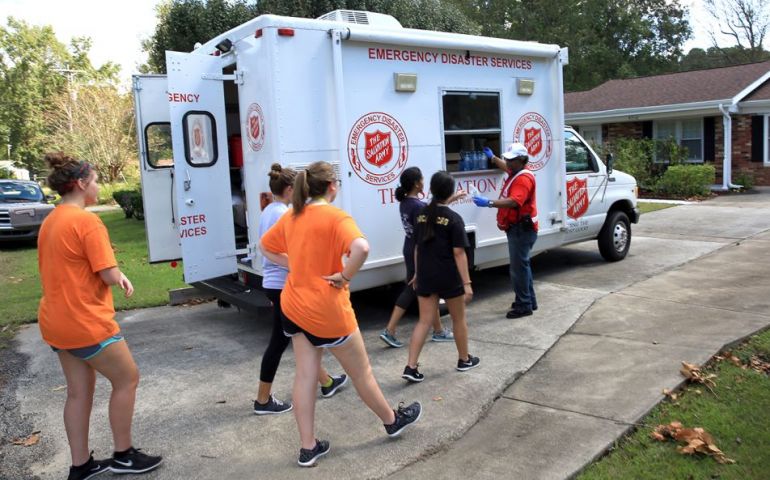The Salvation Army A Shelter in the Storm for SC Community
Donald Felice | donald.felice@uss.salvationarmy.org

CONWAY, SC (September 19, 2018) – A line of U-Haul trucks snaked their way into the little residential community called Rosewood, S.C., joining the other U-hauls already backed into numerous driveways along the cozy winding streets. Rosewood’s residents saw what rising flood waters did to their homes during Hurricane Matthew two years ago, and were taking preemptive action against the same rising rivers due to Hurricane Florence.
Adult residents rallied the youth into bands that roamed the neighborhoods giving an abundance of helping hands to friends and neighbors moving furniture and valuables into their rented U-Haul trucks. All the while, a Salvation Army canteen was parked in the midst of the buzz of neighborhood activity handing out water and hot meals to those working to save what they could of their community life.
“My bishop told me you guys were here and I came running,” says one of the residents who asked to remain un-named. “We have a family of six and we need these meals.”
Her family lost everything during Hurricane Matthew. Two years later, after failed attempts to secure governmental and other funding to repair their home, their bank accounts were drained and they were dependent on help from friends and their church. “Since Matthew flooded our home, we spent everything on an apartment and house repairs,” she says, “The drywall is up, but it’s not finished, we don’t have all our electrical outlets yet, and we are using blankets for curtains.”
They moved back to the Rosewood community in July looking forward to picking up the pieces of their lives and getting settled back into a normal life. Her main concern now is for the kids. “It’s just not fair,” she said, “We spent everything to get back into our house, now it’s happening again – we just want to shelter the kids from the fear and memories of what happened during Matthew.”
While every disaster is unique and creates its own special needs, the core of The Salvation Army's disaster program addresses many of the typical needs of a disaster survivor, but it is also flexible. Services are adapted to the specific needs of individuals and communities and scalable according to the magnitude of the disaster.
“We tried to get help from many places during Matthew, but the only people that helped us was The Salvation Army,” she said. “You did what you said you’d do and fulfilled your promises then, and we are so very, very grateful that you are here now. You guys are our shelter in these storms.”
How to Help
The best way to help after a disaster is to make a financial donation. Monetary donations allow disaster responders to immediately meet the specific needs of disaster survivors as the situation continues to be assessed.
Online: helpsalvationarmy.org
Donate by phone: 1-800-SAL-ARMY
Mail checks to: The Salvation Army, P.O. BOX 1959, Atlanta, GA 30301
Please designate '2018 Hurricane Season - Florence' on all checks.
To receive a donation link via text: Text STORM to 51555
About The Salvation Army
The Salvation Army annually helps more than 30 million Americans overcome poverty, addiction, and economic hardships through a range of social services. By providing food for the hungry, emergency relief for disaster survivors, rehabilitation for those suffering from drug and alcohol abuse, and clothing and shelter for people in need, The Salvation Army is doing the most good at 7,600 centers of operation around the country. In the first-ever listing of “America’s Favorite Charities” by The Chronicle of Philanthropy, The Salvation Army ranked as the country’s largest privately funded, direct-service nonprofit. For more information, visit www.SalvationArmyUSA.org. Follow us on Twitter @SalvationArmyUS and #DoingTheMostGood.